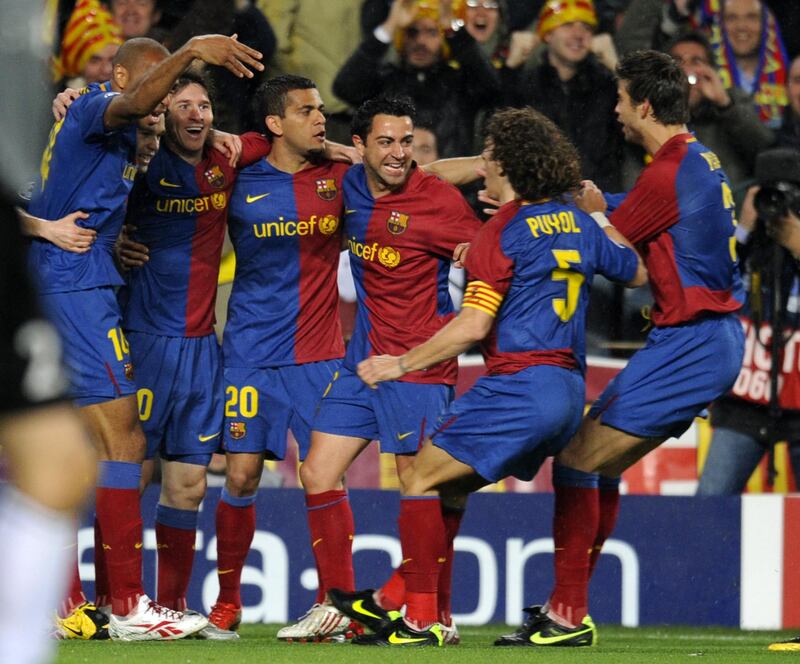Barcelona and Espanyol meet on Saturday night in the biggest Catalan derby. Both clubs have long boasted exceptional youth systems. Barca’s famed Masia system produced the majority of arguably the greatest club side ever, the 2009 and 2011 Uefa Champions League winners featuring Lionel Messi, Gerard Pique, Andres Iniesta, Xavi, Sergio Busquets, Pedro, Victor Valdes, Carles Puyol, Thiago Alcantara and Bojan Krkic.
They were managed by another Masia graduate, Pep Guardiola. In late 2011, the entire Barca team on the pitch at Levante was comprised of youth team graduates.
Barca created footballers and augmented the home-grown talent with some of football’s finest international stars, mocking rivals Real Madrid for their galactico system of buying already established players.
Barca’s system is declining and facing new threats. Twelve of Espanyol’s 25-man-first-team squad are graduates from their academy, while only eight of Barca’s players have come through the ranks, down from 16 four years ago. Then, only Pinto, Dani Alves, Adriano, Javier Mascherano, Alex Song, Alexis Sanchez and Neymar had not come through the club’s youth system from the entire squad.
Messi is still around and expected to sign a new contract. So is Iniesta, though this week he denied it had been signed when the club president Josep Maria Bartomeu gave out a different message. Busquets, Jordi Alba, Rafinha, Gerard Deulofeu and Sergi Roberto make up the numbers, but a 50 per cent reduction in four years doesn't encourage fans, especially those who hoped it would be maintained and even improved with the move to new training facilities at Sant Joan Despi.
WATCH: Paulinho says joining Barcelona a 'dream for me'
Graduates such as Samper impressed, but he was laoned to Las Palmas after Barca bought Paulinho, a move which didn’t convince fans.
Barça’s B team also won promotion to Spain’s second tier for this season, becoming one of only two reserve sides with Sevilla to be playing at such a high level, but the youth system will be judged on how many players make the first team. It has long been a proven, enviable pathway at Camp Nou where the main stadium dominates the reserve ground like an enticing mother ship advertising the ultimate prize.
Espanyol’s system is the result of financial necessity, excellent scouting, community programmes, training facilities in the working class district of Sant Adria and being based in Catalonia, a football factory of seven million.
Espanyol also cast a wide net. They brought Eric Bailly, now at Manchester United, from Africa after trial games when he was 15. The defender had to wait two years for his papers to clear to play professionally, after which his progress was rapid. Espanyol only lost the Catalan youth league to Barca on goal difference last season.
United have this week bought Arnau Puigmal, a 16-year-old Catalan at Espanyol who Barca were keen to sign after he was named best player at this year’s prestigious MIC tournament in Catalonia, which Espanyol won against Barca, the pair having eliminated some of the best clubs in world football, including United. Espanyol had hoped he would progress to the first team by the time he was 18.
Young players earn more in England, the agents representing them too. Manchester City enticed Eric Garcia from Barca this year. It doesn't always work out as hoped. Joan Angel Roman, tempted from Espanyol in 2009 when Barca wanted him and he was considered the best young Catalan player, is now 24 and was a fringe player for a mid-table Polish side Slask Wroclaw last season.
They are easily forgotten as clubs look to the future and City’s interest in newly promoted Girona is likely to see more competition for the best young Catalan players for Barcelona’s big two.
It is not only players, but coaches and club officials. United’s new senior scout is Javier Ribalta, a Catalan who was at Juventus. Much of City’s senior administration staff is also Catalan, including their chief executive Ferran Soriano.
As Barcelona’s biggest teams clash on Saturday night, some of Catalonia’s most influential football people will be in England’s north west, working for Manchester’s big clubs.
Subscribe to iTunes to download all of The National's Extra Time football podcasts






